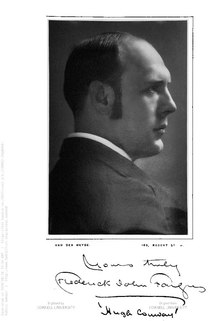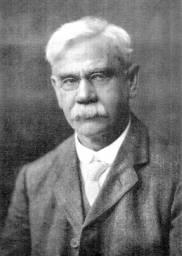A Quote by William Makepeace Thackeray
Ah! gracious Heaven gives us eyes to see our own wrong, however dim age may make them; and knees not too stiff to kneel, in spite of years, cramp, and rheumatism.
Related Quotes
However we may flatter ourselves to the contrary, our friends think no higher of us than the world do. They see us through the jaundiced or distrustful eyes of others. They may know better, but their feelings are governed by popular prejudice. Nay, they are more shy of us (when under a cloud) than even strangers; for we involve them in a common disgrace, or compel them to embroil themselves in continual quarrels and disputes in our defense.
Devil does not bring sinners to Hell with their eyes open: he first blinds them with the malice of their own sins. He thus leads them to eternal perdition. Before we fall into sin, the enemy labours to blind us, that we may not see the evil we do, and the ruin we bring upon ourselves by offending God. After we commit sin, he seeks to make us dumb, that, through shame, we may conceal our guilt in confession.
Every day we touch what is wrong, and, as a result, we are becoming less and less healthy. That is why we have to learn to practice touching what is not wrong—inside us and around us. When we get in touch with our eyes, our heart, our liver, our breathing, and our non-toothache and really enjoy them, we see that the conditions for peace and happiness are already present.
Often the answer to our prayer does not come while we’re on our knees but while we’re on our feet serving the Lord and serving those around us. Selfless acts of service and consecration refine our spirits remove the scales from our spiritual eyes and open the windows of heaven. By becoming the answer to someone’s prayer we often find the answer to our own.
I know that my work in this case is magnified by the fact that the streets of heaven are too crowded with angels. We know their names. They number a thousand for each one of the red ribbons that we wear here tonight. They finally rest in the warm embrace of the gracious creator of us all. A healing embrace that cools their fevers, that clears their skin, and allows their eyes to see the simple, self-evident, common sense truth that is made manifest by the benevolent creator of us all...
Give us, O God, the vision which can see Your love in the world in spite of human failure. Give us the faith to trust Your goodness in spite of our ignorance and weakness. Give us the knowledge that we may continue to pray with understanding hearts. And show us what each one of us can do to set forward the coming of the day of universal peace.
We are perhaps too near the age of transition to see clearly the interplay of all that made for progress. Each of us has had his own peculiar training, his own personal contact with the mighty ones of the immediate past; and this forms as it were a telescopic tube determining limits to our field of vision. No doubt we may range the whole horizon; but after all we look from our own point of vantage.
It is our genetic nature as a species to believe as young children that our parents and elders are right. We watch them to see what's what. Later on we can judge for ourselves and rebel if need be, but when we're just months old, or a year or two, and a parent looks at us with impatience, or disgust, or disdain, or just leaves us there to cry and doesn't answer us even though we're longing to be embraced and nurtured, we assume that something must be wrong with us. Unfortunately, at that age it's impossible to think there might be something wrong with them.
...Rose of all Roses, Rose of all the World! You, too, have come where the dim tides are hurled Upon the wharves of sorrow, and heard ring The bell that calls us on; the sweet far thing. Beauty grown sad with its eternity Made you of us, and of the dim grey sea. Our long ships loose thought-woven sails and wait, For God has bid them share an equal fate; And when at last defeated in His wars, They have gone down under the same white stars, We shall no longer hear the little cry Of our sad hearts, that may not live nor die.






































